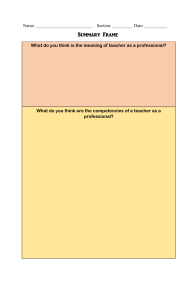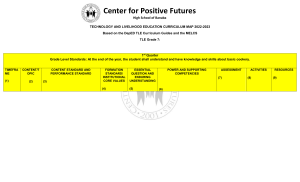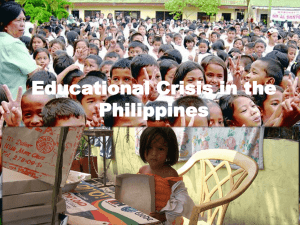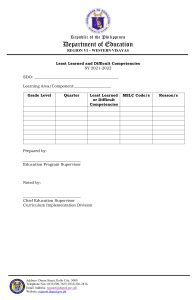PROFED5- The teacher and the School Curricular-Module 8.3
advertisement
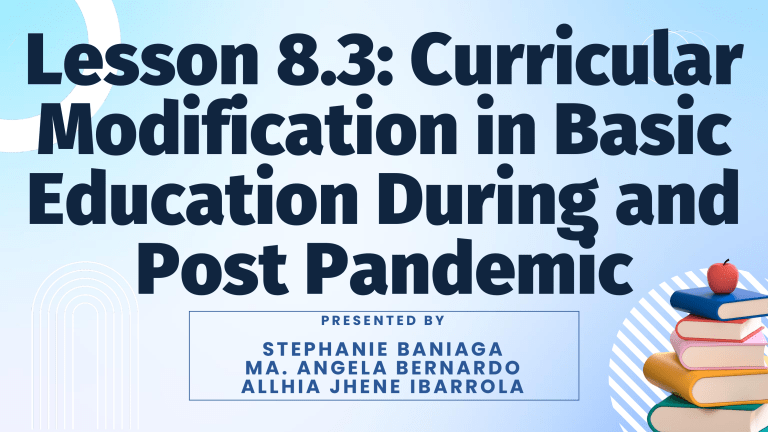
Lesson 8.3: Curricular Modification in Basic Education During and Post Pandemic PRESENTED BY STEPHANIE BANIAGA MA. ANGELA BERNARDO ALLHIA JHENE IBARROLA - In the period of COVID-19 crisis, the Department of Education came up with Most Essential Learning Competencies. - Trimming down curriculum to the most essential for effective learning. - When curriculum focused on essentials, the mile-wide-inch-deep teaching approached is avoided. MOST ESSENTIAL LEARNING COMPETENCIES (MELCs) FAUGET UNIVERSITY - 60% of reduction of learning competencies in the K to 12 Curriculum Guide from 14,171 competencies to 5, 689 Most Essential Learning Competencies - The reduction of the number of competencies may lead to more focused teaching. Teaching should focused on essentials. VARIOUS CURRICULUM DELIVERY MODES Due to the ongoing threat of COVID19, face-to-face instruction is unlikely until a vaccine is available. In the meantime, education will continue remotely, shifting from traditional classrooms to virtual platforms, with delivery modes based on the local COVID-19 situation and access to learning platforms as per DepEd's continuity plan. -refers to education that takes place over the internet. Students access educational content, submit assignments, and interact with instructors through online platforms. FAUGET UNIVERSITY 1. ONLINE LEARNING 2. ALTERNATIVE DELIVERY MODE This term encompasses various non-traditional methods of delivering education. It can include approaches beyond the typical classroom setting, such as experiential learning, project- based learning, or even learning through educational games FAUGET UNIVERSITY 3. DISTANCE LEARNING Involves the physical separation of students and instructors. Communication and instruction occur remotely, often utilizing technologies like mail, radio, television, or the internet. FAUGET UNIVERSITY When parents or guardians take on 4. the role of the educators HOME- primary for their children, SCHOOLING providing instruction at home. It allows for a personalized curriculum tailored to the student's needs. FAUGET UNIVERSITY 5. ALS is a parallel learning system in ALTERNATIVE the Philippines LEARNING designed for those who cannot access SYSTEM formal education. It includes non-formal (ALS) education programs and opportunities for skills development. FAUGET UNIVERSITY The Department of Education (DepEd) emphasizes that online learning is just one of the many ways education is delivered in the current learning environment. It is advisable for schools to address valid concerns raised by stakeholders regarding online learning, including connectivity, accessibility, and the availability of necessary equipment such as computers and printers for both teachers and students. ALTERNATIVE DELIVERY MODE(ADM) The DepEd-recognized nontraditional education program characterized by a flexible learning philosophy and a curriculum that incorporates non formal and informal sources of knowledge and skills. 1. MODIFIED IN-SCHOOL AND OFF-SCHOOL APPROACH (MISOSA) FAUGET UNIVERSITY -refers to adjustments or changes made to the traditional educational methods within the school setting and beyond it. 2. ENHANCED INSTRUCTIONAL MANAGEMENT BY PARENTS, COMMUNITY AND TEACHERS (E-IMPACT) FAUGET UNIVERSITY -This suggests an improvement in how instruction is organized, facilitated, and supported. Parents, community members, and teachers play active roles in managing the instructional process. 2. ENHANCED INSTRUCTIONAL MANAGEMENT BY PARENTS, COMMUNITY AND TEACHERS (E-IMPACT) FAUGET UNIVERSITY -This suggests an improvement in how instruction is organized, facilitated, and supported. Parents, community members, and teachers play active roles in managing the instructional process. ALTERNATIVE MODALITY 1. DISTANCE LEARNING - This include delivery of educational content online, digitally or through radio and television. In this COVID-19 crisis, the Philippine government offered government-run television and radio stations as platforms for delivering lessons. 2. HOMESCHOOLING - It is another flexible learning option recognized by DepEd. Based on the policy guidelines released by DepEd, homeschooling provides learners with access to formal education while staying in an out-of-school environment. 3. Alternative Learning System (ALS) - It is a “parallel learning system that provides a practical option to the existing formal instruction. When one does not have or cannot access formal education in schools, ALS is an alternate or substitute.” Two Major Programs on ALS 1. Basic Literacy Program - An intensive communitybased training for illiterate out-of-school youth and adults, who are willing to learn basic literacy skills. 2. Continuing Education Program – Accreditation and Equivalency (A&E) - Provides certification for skills and knowledge acquired after passing the NFE A&E Test. The certificates can then be used for reentry into the formal school system or for employment. THANK YOU FOR YOUR ATTENTION
